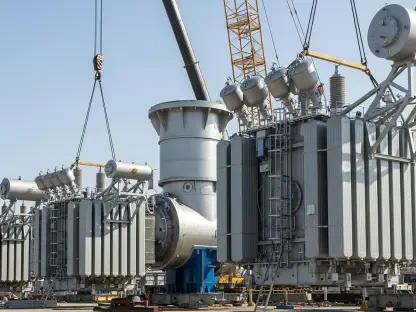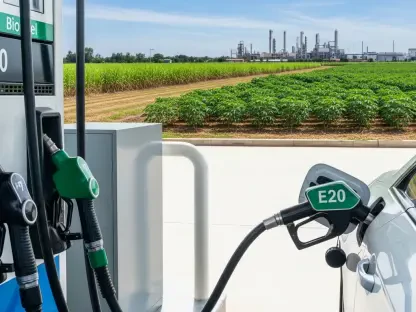Amid global shifts towards sustainable energy, Indonesia has taken a significant step by forming a specialized task force dedicated to accelerating the country’s green energy transition. Despite the withdrawal of the United States from the Just Energy Transition Partnership (JETP), Indonesia remains committed to this crucial endeavor. The newly established task force, under the guidance of Coordinating Minister for Economic Affairs Airlangga Hartarto, symbolizes Indonesia’s determination to lead the charge towards a green economy.
Strategic Policy Alignment
Enhancing Inter-Ministerial Coordination
The creation of the task force aims to foster greater coordination among various government departments, ensuring alignment of policies and the efficient flow of renewable energy investments. This task force comprises senior officials from multiple ministries, all working collaboratively to streamline business applications related to clean energy projects. By consolidating efforts within a dedicated body, the Indonesian government hopes to eliminate bureaucratic red tape that can stall the progress of crucial initiatives.
The Energy Transition Mechanism (ETM) is an integral part of this effort, focusing on the early retirement of coal-fired power plants. The task force’s role is to ensure that policies aligned with the ETM are effectively implemented, thereby promoting a substantial shift towards more sustainable and cleaner energy sources. This inter-ministerial cooperation is vital in overcoming administrative and technical challenges that could impede the nation’s green transition goals.
Supporting JETP Goals
Despite the noticeable gap left by the U.S. withdrawal, Indonesia has received assurances that the JETP funding will remain stable. Other contributing nations have pledged support to fill the financial gap, ensuring that the $2 billion funding pool dedicated to phasing out coal and reducing carbon emissions remains intact. Countries like Germany and Japan are now co-leading JETP, with additional contributions from Denmark, the United Kingdom, Italy, Canada, Norway, France, and the European Union.
This international cooperation underscores a broader commitment to addressing climate change, even amid shifting geopolitical landscapes. The steadfast support of these nations will help mitigate the impact of the U.S. withdrawal, ensuring that Indonesia’s green transition objectives remain on track. The task force’s role includes maintaining these international partnerships and leveraging the collective financial and technical expertise to drive progress.
International Collaboration and Funding
Secured International Funding
Within the JETP framework, Indonesia has already secured international funding for 54 projects, with commitments totaling $1.1 billion. This impressive sum includes $233 million in grants and $1 billion in guarantees from multilateral development banks. These funds play a pivotal role in accelerating Indonesia’s shift from traditional fossil fuels to more sustainable energy sources like wind, solar, and hydroelectric power.
These projects are essential not only for reducing carbon emissions but also for enhancing the reliability and sustainability of Indonesia’s power grid. The task force will be instrumental in ensuring that these projects are carried out efficiently, maximizing the impact of international financial support. This focus on efficient project implementation is crucial for maintaining the trust and support of international donors.
Commitment to Emission Reduction
Indonesia’s objective to reduce carbon emissions from its power sector to 250 million tons by the end of the decade demonstrates a significant commitment to combating climate change. This target is part of a broader ambition to increase the share of renewable energy in the national power mix to 44%, up from the current 12%. Achieving these ambitious goals will require concerted efforts, robust policies, and substantial investments, all of which the task force aims to facilitate.
The target to reach net-zero emissions by mid-century aligns with global efforts to limit global warming. However, the timeline has seen some debate, with the Coordinating Minister for Economic Affairs pushing for a 2060 target, and President Prabowo Subianto suggesting a 2050 goal during the recent G20 summit. Regardless of the exact timeline, these objectives highlight the government’s intensive focus and the urgency of its green transition efforts.
Future Prospects for Green Energy
Steering Towards a Green Economy
Indonesia’s proactive approach in forming a specialized task force illustrates a clear commitment to transitioning towards a green economy. The task force, by ensuring efficient policy implementation and fostering international cooperation, paves the way for extensive renewable energy adoption. This proactive stance is crucial for mitigating the environmental impacts of Indonesia’s historically coal-dependent energy sector.
Active engagement with international partners ensures that the transition is well-funded and technologically supported. The task force’s efforts in aligning policies with global climate goals will position Indonesia as a key player in the worldwide shift towards sustainable energy. The enhanced coordination and clarity in implementing green policies create an environment conducive to attracting further investments in renewable energy projects.
Setting a Global Example
The challenges posed by the U.S. withdrawal from JETP have not deterred Indonesia’s commitment. Instead, the country has showcased resilience and adaptability, securing support from other nations and reinforcing its dedication to a green transition. By doing so, Indonesia sets an example for other countries facing similar challenges, demonstrating that cohesive international collaboration can overcome geopolitical setbacks.
The government’s focus on achieving substantial emission reductions and increasing the renewable energy share in the power mix reflects a strategic vision for a sustainable future. This commitment not only addresses environmental concerns but also positions Indonesia favorably in the global green energy market. As the task force continues its work, Indonesia’s strides towards a sustainable energy future remain both ambitious and achievable.
Indonesia’s Commitments and Actions
Task Force’s Broad Mandate
The task force is charged with an extensive mandate that encompasses policy coordination, international cooperation, and project implementation oversight. By integrating efforts across multiple government departments, the task force ensures a unified approach to achieving Indonesia’s green energy goals. This broad mandate allows the task force to address various challenges comprehensively, from regulatory hurdles to technical implementation issues.
Furthermore, the task force aims to facilitate the swift approval and initiation of renewable energy projects. By streamlining administrative processes, the task force not only accelerates project timelines but also builds investor confidence. This confidence is crucial for attracting additional international funding, which will be needed to meet Indonesia’s ambitious targets.
Long-Term Vision
The long-term vision of the task force is to position Indonesia as a leader in the global green energy sector. By leveraging international partnerships and securing substantial investments, the task force aims to create a sustainable and resilient energy infrastructure. This vision extends beyond immediate targets, focusing on establishing a robust foundation for long-term environmental and economic benefits.
In essence, the task force represents a strategic approach to realizing Indonesia’s green transition ambitions. Through coordinated efforts, international collaboration, and efficient project implementation, Indonesia is well on its way to achieving its renewable energy goals. The task force’s work exemplifies the nation’s dedication to a sustainable future, ensuring that Indonesia remains at the forefront of the global fight against climate change.
Global Impact and Leadership
In response to the global push towards sustainable energy, Indonesia has made a notable move by creating a specialized task force to speed up its green energy transition. Even though the United States has exited the Just Energy Transition Partnership (JETP), Indonesia stays dedicated to this essential initiative. The new task force, directed by Coordinating Minister for Economic Affairs Airlangga Hartarto, represents Indonesia’s strong commitment to leading the way towards a sustainable and green economy. This development is crucial as the world increasingly shifts towards renewable energy and sustainable practices. Hartarto’s leadership will be instrumental in steering the country’s policies and ensuring that the transition is both effective and efficient. Despite the challenges posed by the U.S. withdrawal from the JETP, Indonesia’s ambition to become a leader in green energy remains undeterred. Therefore, Indonesia’s efforts will likely serve as a model for other nations attempting similar green transitions.









